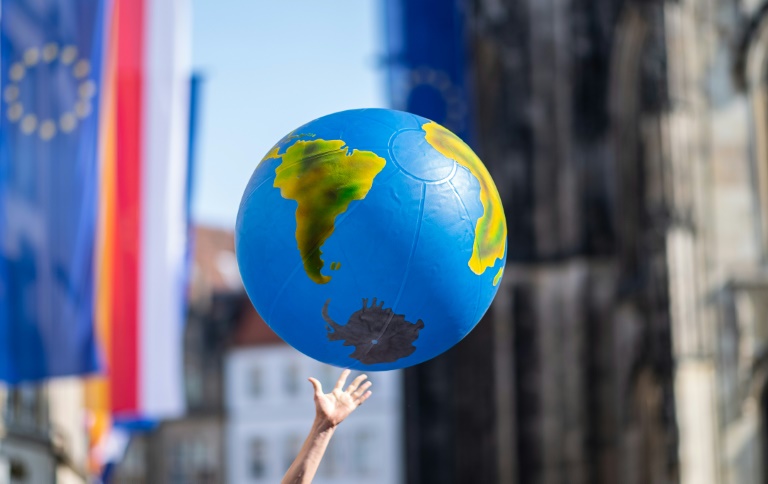Billed as a chance for humanity to save itself from climate catastrophe, the United Nations COP26 summit starting Sunday will task world leaders with turning ambitions to restrain global heating into the actions needed to slash greenhouse gas emissions.
With just over one degree Celsius warming so far after 150 years of burning fossil fuels, the world is experiencing a rapid-fire onslaught of weather disasters supercharged by climate change.
Since the last UN conference in 2019, record-shattering wildfires have scorched across Australia, Western Europe and the United States; North America has sizzled in a once-in-a-thousand-year heatwave; and extreme rainfall has caused massive flooding in Asia, Africa, the US and Europe.
Experts warn that only transformative action will help stave off far more devastating climate impacts, not just for humanity but most life on Earth.
“We don’t have much time,” said David King, a former British climate envoy who now heads the Climate Crisis Advisory Group.
“What we do over the next five to ten years will determine the future of humanity for the next millennia,” he told AFP.
But the road to climate salvation is strewn with obstacles. Nations under pressure to revitalise Covid-ravaged economies continue to subsidise fossil fuels, even as they tout renewables.
Anger among developing nations has also reignited over funding shortfalls and unequal access to Covid-19 vaccines that has prevented some delegates from attending.
Currently, the world is holding a “one-way ticket for disaster”, UN Secretary-General Antonio Guterres warned last week.
– ‘Insanity’-
The Glasgow gathering, which runs from October 31 to November 12, is the latest and most urgent summit in a protracted diplomatic process entering its fourth decade.
In 2015, the Paris deal called for capping global warming at “well below” 2C above pre-industrial levels, and 1.5C if possible.
But in August a bombshell “code red” report from the world’s top climate science body warned that Earth’s average temperature will hit the 1.5C threshold around 2030, a decade earlier than projected only three years ago.
And this week a UN report said even the latest, most ambitious carbon cutting commitments would still lead to “catastrophic” warming of 2.7C.
“Insanity is keeping doing the same thing in the hope of getting a different outcome,” said Myles Allen, Professor of Geosystem Science at Oxford University, adding that at this rate the 2030 targets will be met in the 2080s.
Guterres said much rests on commitment from G20 leaders — meeting in Rome just ahead of the COP — whose economies account for about 80 percent of carbon pollution.
“If they do not stand up… we are headed for terrible human sufferings,” he said.
– Climate justice –
Observers say there are glimmers of hope, with the US announcing a doubling of overseas climate aid and China saying it will cease new coal production abroad.
President Xi Jinping announced last year his country’s aim for carbon neutrality by 2060 and for domestic emissions to peak “around 2030”.
But China, the world’s largest emitter, has still not submitted its renewed emissions cuts pledges.
And Xi, who has not left China during the pandemic, is unlikely to travel to Glasgow, although COP26 President Alok Sharma said Tuesday he still hopes the Chinese leader will attend.
Vladimir Putin of Russia, another major polluter, will also be a no-show.
Meanwhile, Britain’s 95-year-old Queen Elizabeth II this week cancelled her attendance on health grounds.
But more than 120 heads of state and government will make the trip to kick off the 13-day meeting, including US President Joe Biden, India’s Narendra Modi, French leader Emmanuel Macron and Australia’s Scott Morrison.
Climate activists including Extinction Rebellion will gather in Glasgow to keep up the pressure, while Greta Thunberg confirmed she would join a November 5 march for “climate justice” in the city.
With poorer nations least responsible for greenhouse gas emissions hit hardest by its impacts, inequality overshadows the negotiations.
The failure of rich countries to cough up $100 billion a year starting in 2020 to help developing nations lower emissions and adapt — a pledge first made in 2009 — will complicate the already fraught talks.
Assurance by ministers this week that the goal should be reached by 2023 seems only to have poured oil on the fire.
“We absolutely do not have the luxury of accommodating more and more delays,” said Walton Webson, who heads up the Alliance of Small Island States, adding that the Paris goals were “a matter of survival”.
– ‘What’s your excuse?’ –
Organisers have already warned the negotiations may fail to reach their objectives.
British Prime Minister Boris Johnson has previously summed up his hopes for Glasgow as “coal, cars, cash and trees” — meaning deals for global phaseouts of coal power and internal combustion engines, funding for climate-vulnerable nations and tree planting.
Other tasks are less clear cut, including governing the carbon markets and finalising a “rulebook” for the Paris Agreement that specifies how goals are to be reached and progress measured.
But experts warn that the stakes could not be higher.
That point was underscored with dark humour this week in a video released by the UN Development Programme, which shows a dinosaur striding into a UN meeting and declaring: “I know a thing or two about extinction”.
“At least we had an asteroid,” it continues. “What’s your excuse?”









